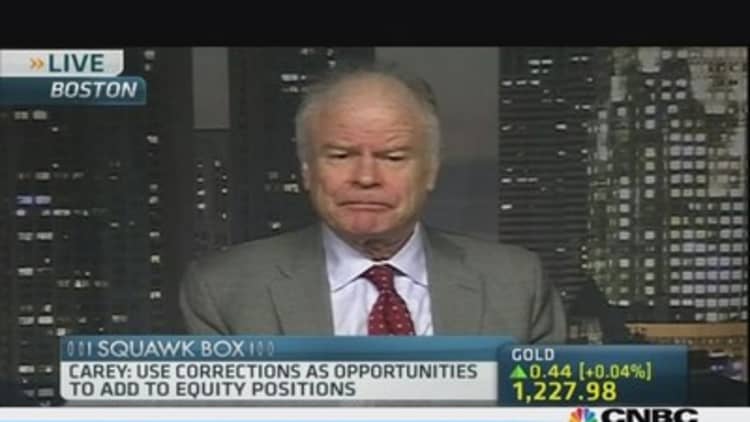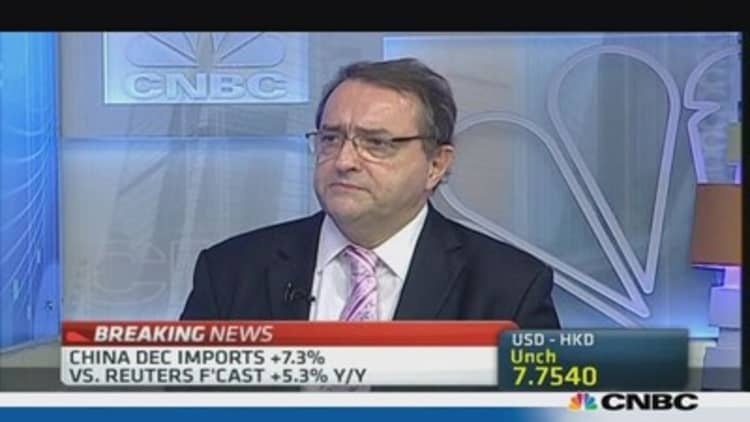Asian equity markets ended mixed on Friday following a weak trade report from China and as caution prevailed ahead of the much-anticipated December U.S. jobs report.
came in at $25.6 billion, far short of the $31.15 billion Reuters predicted, while exports rose an annual 4.3 percent last month, missing estimates for a 4.9 percent rise. Imports however, beat expectations to jump an annual 8.3 percent.
"Perhaps the fact that the numbers out of China aren't that bad suggests there is no need for officials to loosen policy, which is deemed a negative by some investors," said Stan Shamu, market strategist at IG in a note.
(Read more: )
Meanwhile, investors were awaiting Friday's non-farm payrolls report, due out later in the global day. Market expectations are for a payrolls number around 197,000 jobs, with the unemployment rate seen at 7 percent.
Nikkei up 0.2%

Japan's benchmark Nikkei index reversed losses to eke out modest gains in the final hour of trade but still posted its worst weekly loss since October, according to Reuters data.
A 3.3 percent gain in index heavyweight Fast Retailing helped push the index into positive territory after the clothing giant posted an 8.8 percent annual rise in net profit for the September-November quarter.
Among the top losers, robotics maker and shed 2.8 and 3 percent, respectively.
(Read more: )
Shanghai falls 0.7%
China's benchmark Shanghai Composite index fell to a new five-month low for a second straight session following December's slow export growth and as investors continued to be afraid that a glut of initial public offerings (IPOs) will weigh on share prices.
For the week, the index was the region's worst-performer with losses over 3 percent.
(Read more: )
Automakers declined despite an industry report that showed auto sales rose 15.7 percent last year. Dongfeng Auto shed 1.4 percent while FAW fell 0.6 percent.
In Hong Kong, lost as much as 1.7 percent after its London-listed shares hit an 18-month low following the bank's management shake-up.

Sydney down 0.2%
Australia's resource-heavy benchmark eased on the back of lower commodity prices while the traded within sight of 90 U.S. cents despite China's weak trade data.
Miners Rio Tinto and Fortescue Metals shed 2.5 and 3 percent, respectively after copper prices hit a two-week low. Meanwhile, Alumina skidded 4 percent, tracking Alcoa's near 3 percent fall overnight after the U.S. aluminum giant posted disappointing earnings.
Home builders were mixed after data showed new home sales hit a two-year high. Bluescope Steel lost 2.6 percent while James Hardie rallied 3 percent.
Kospi slips 0.4%
South Korean shares closed at a new four-month low for a second straight session on worries about a weaker earnings outlook for the October-December period.
Shipbuilders dragged on the benchmark Kospi index with down nearly 5 percent and 6 percent lower.
But steelmaker Posco rose 0.5 percent after finally receiving approval from India's environment ministry for its steel plant in the state of Odisha.
Emerging markets mixed
Indian shares tacked on 0.2 percent while Thailand's finished over 0.2 percent lower on concerns that political unrest will hit economic growth.
— By CNBC.com's Nyshka Chandran. Follow her on Twitter @NyshkaCNBC

